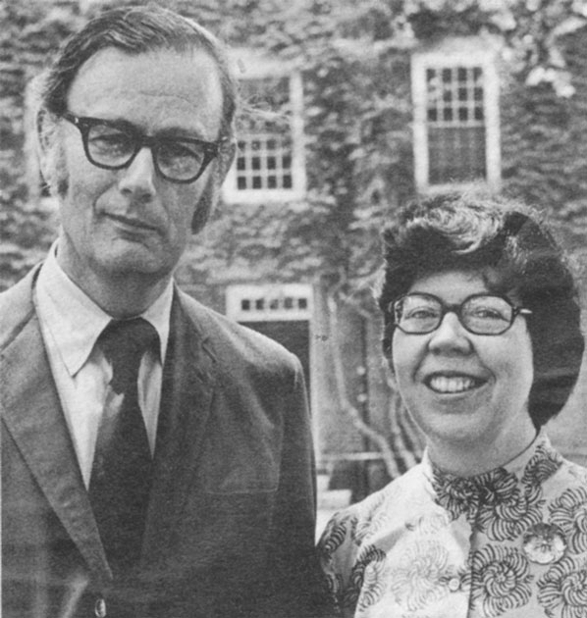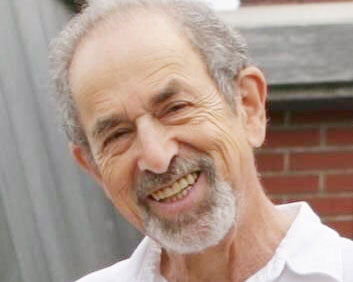Historian of towering stature
Wallace Trevethic MacCaffrey ’42

Wallace and Isobel Gamble MacCaffrey in 1972.
Wallace Trevethic MacCaffrey ’42, December 13, 2013, in Cambridge, England.
Wallace MacCaffrey, a figure of towering stature in the field of English history and Francis Lee Higginson Professor of History Emeritus at Harvard University, died at 93. “Although he had been failing physically for some time, he retained his formidable mental capacities to the end and died peacefully and without pain in Addenbrookes Hospital in Cambridge,” wrote Prof. David Sacks [history 1986–]. “A good death after a long and good life.”
Wallace spent his childhood on a farm in La Grande, Oregon. His parents were immigrants from Great Britain and his father served in the U.S. Army during World War I. He developed an interest in reading at an early age, preferring this over social activities of other children, he said in an interview in 2003. He received special permission to have a library card, which gave him access to a great many historical works, as well as English, French, and Russian novels, and he was well prepared for high school courses. The year following graduation, he earned money for college by working as a secretary and stenographer at a local flour mill. Then he enrolled in a two-year liberal arts course at Eastern Oregon College of Education (now Eastern Oregon University), and following that, enrolled at Reed, moving with his parents to Portland.
He completed the thesis, “The Canadian Nation and the British Commonwealth, 1917-1926,” with Reginald Arragon [history 1923–62; 1970–74] as his adviser. Drafted into the army in the spring of his senior year, but found to be underweight, his enlistment was postponed until fall 1942. While awaiting enlistment, he worked for the Portland office of the Union Pacific Railway, and during World War II received language training and supervised Italian soldiers who had been taken prisoner in North Africa. His service ended in 1946 and he entered Harvard that fall, teaching briefly at Reed in the interim.
Wallace earned a PhD from Harvard in 1950 and then taught at UCLA and Haverford College. In 1956, he married Isobel Gamble, a nationally known authority on English Renaissance literature, and, later, the first woman to chair the history and literature department at Harvard. They spent their honeymoon in England, where Wallace studied at Churchill College in Cambridge on a Guggenheim Fellowship. In 1968–69, they returned to England when he was a fellow at Churchill College. Isobel’s death from cancer came in 1978.
The focus of Wallace’s historical interest was early modern British history, particularly, but not exclusively, of politics and of policy making in the Elizabethan era. His first book, Exeter, 1540–1640: The Growth of an English Country Town, published in 1958, set the agenda for all subsequent work by others in early modern English urban history and remains a model for similar studies. Wallace then went on to investigate the significance of great matters of state in the history of the Elizabethan era, and of the era’s influence on modern Britain and the modern state. The first of three volumes, The Shaping of the Elizabethan Regime, was published in 1968.
“Wallace, whose graduate student I was at Harvard, told me that Rex Arragon was the finest teacher with whom he had studied or that he had ever observed, someone who knew how to guide a discussion without appearing to do so but also without letting ignorance or error go uncorrected,” Sacks says. “Something clearly rubbed off, since Wallace is certainly the finest teacher I have known in any capacity—an exemplary mentor, an extraordinary and lucid lecturer, and a brilliant conference and seminar leader in the Rex Arragon and Reed manner.”
Lifelong friend Carl Stevens ’42 [economics 1954–90] revered Wallace’s skills as an historian. These, according to Sacks, include “an abiding curiosity about what had happened in the past; a relentless instinct for digging into the surviving evidence to get to the bottom of things; a devotion to precision and accuracy in regard to the facts; judiciousness and sound judgment in interpreting what he had found; an astute critical eye always exercised in a spirit of generosity; an ‘awesome’ and awe-inspiring capacity to tell a story in a vivid and lucid way; and perhaps—above all—a breadth of historical interests and a passion for knowledge about the past that with only a bit of exaggeration makes real the adage derived from the Roman playwright Terence: ‘Nothing human is alien to me.’”
Wallace demonstrated these qualities practically every day, says Sacks, by leaving his home in the village of Girton Cambs near Cambridge—where he settled in retirement—and making his way into the Cambridge University Library. “One could almost always find him there in the library’s tea room around 11 a.m., ready for an illuminating conversation about history or literature or politics and current affairs, and in the reading room the rest of the day, devouring one work of history and then the next. He was a great fan of big books—big in size, big in scope, and big in conception. He thought of reading these books as his sustenance, and often spoke of having a ‘good diet’ of them. If you are seeking someone living what is sometimes called ‘the life of the mind,’ Wallace would be a model.”
Wallace was presented the Levinson Award for the best undergraduate teaching at Harvard for the academic year 1983–84, retired as faculty emeritus in 1990, and then moved to England, where he was a fellow at Trinity Hall, and, according to Sacks, “a presence and friend to generations of young scholars as well as Cambridge dons and library regulars ever since.” For his distinction as an historian, he was also presented the Foster-Scholz Club Distinguished Service Award in 1992.
In 2004, Wallace received one of the American Historical Association’s (AHA) prestigious awards for scholarly distinction, recognizing him as a scholar “whose moderation, judicious presentations, careful probing of the evidence, and great narrative skills transcend momentary academic battles and manifest wisdom and fair-mindedness in assessing historical arguments.” The AHA cited his exceptional standards in historical writing, his selfless scholarship, and his generosity of spirit, which extended to students, colleagues, and historians everywhere. In 2012, the Reed history department, along with the president’s office, initiated an annual lectureship, the Wallace T. MacCaffrey Distinguished Lecture in History, to honor him not only for distinguished scholarship, but also for his devotion to the college. He was a longtime and generous donor.
“I feel a great sense of debt to Reed,” Wallace said. “At a crucial moment in my life, it offered me what I wanted and gave it to me in a very rich way. Both in the kind of teaching I got and the kind of intellectual life I found among my fellow students.”
Wallace's generous contribution to the college is noted in "From Town to Gown to English Village" in Reed magazine, autumn 2006.
Appeared in Reed magazine: March 2014





![Photo of Prof. Marvin Levich [philosophy 1953–94]](https://www.reed.edu/reed-magazine/in-memoriam/assets/images/2022/LTL-levich1.jpg)
![Photo of President Paul E. Bragdon [1971–88]](https://www.reed.edu/reed-magazine/in-memoriam/assets/images/2020/Bragdon.jpg)
![Photo of Prof. Edward Barton Segel [history 1973–2011]](https://www.reed.edu/reed-magazine/in-memoriam/assets/images/2020/Segel.jpg)








































































